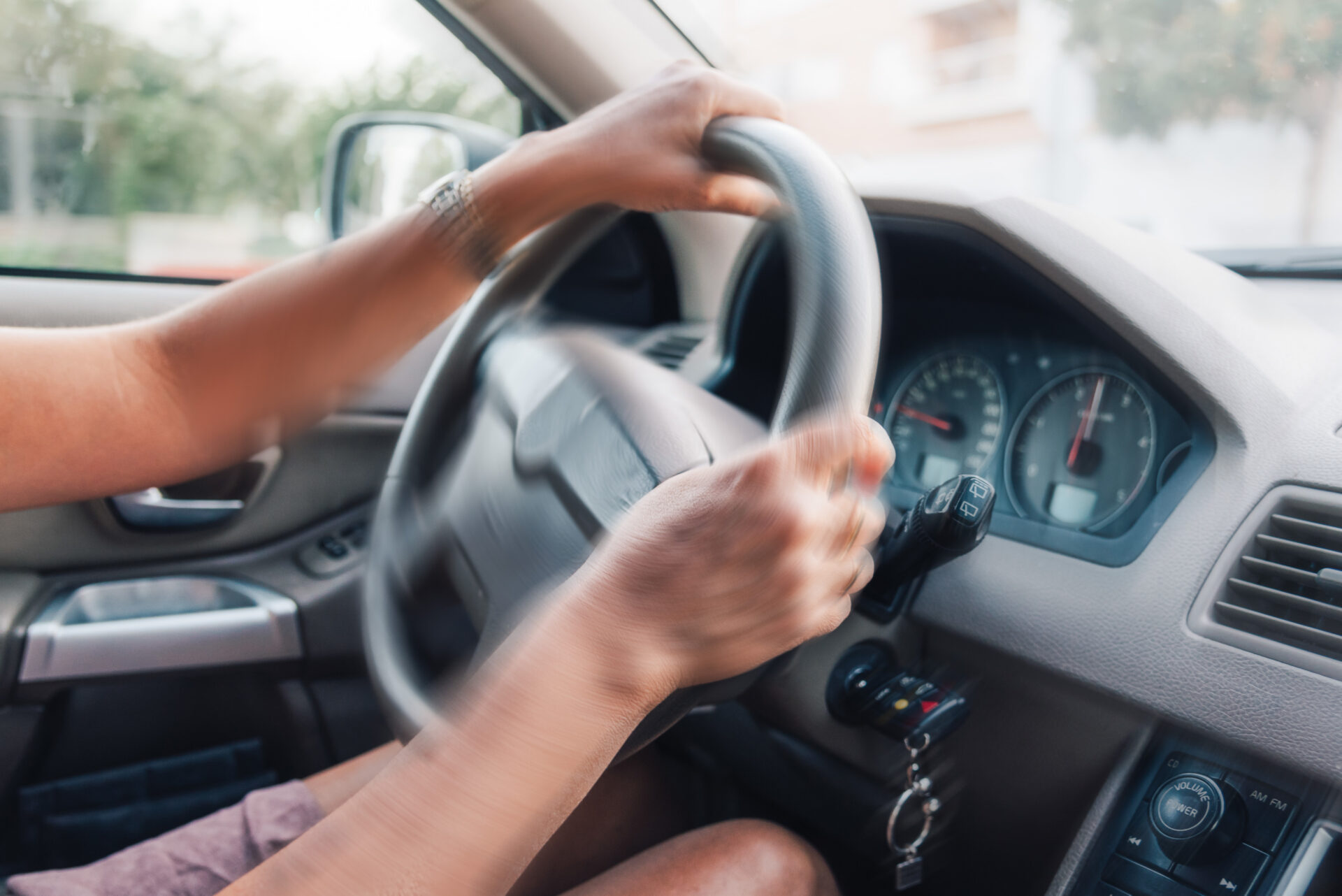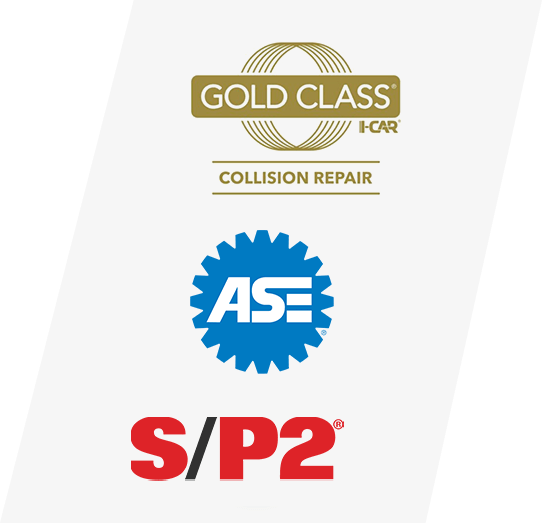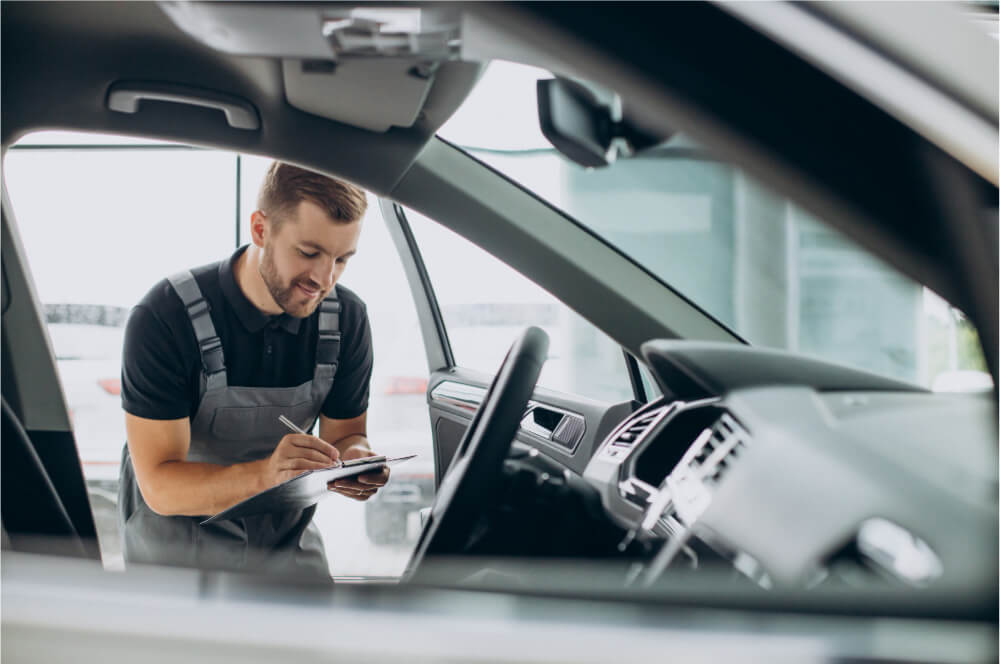Do you ever feel your car shake, vibrate, or jerk when you press on the brake pedal to slow or stop?
This is often referred to as “brake shake,” and it may be subtle or extreme depending on how hard the brake pedal is pressed. Brake shake generally becomes more noticeable when transitioning from city driving to steep mountain driving.
If you have issues with your brakes, it can be nerve-wracking to question the reliability of your stopping ability as you drive around. Are my brakes going to fail? Will the shaking go away or get worse?!
Well…
First off, brake failure is a real possibility.
You really should have the issue diagnosed and resolved as soon as possible. Driving around a 3,000lb+ chunk of metal is generally the most dangerous thing you do, and it’s best to have a smooth, safe, and controlled braking system available at all times.
Secondly, your brake shake and any other problems won’t magically go away, unfortunately. Issues tend to get worse over time and if left unresolved, could lead to additional issues and repairs.
If your car shakes when you brake (even a little bit), we have potential culprits and DIY troubleshooting to share with you!
At Leo’s auto shop in Littleton, Colorado, we often inspect and diagnose braking issues. From cars to large trucks, we’ve talked to our experienced auto mechanics and discovered that the most common reasons for brake shake involve the braking system’s components or the suspension system’s components.
If you want to skip ahead to the first and most common culprit of brake shake, click here on Warped Brake Rotors.
If you want to get an overview of how braking works to better understand how each common culprit causes brake shake, continue reading.
How a car brakes
Firstly, let’s investigate the general idea of how vehicle braking works. Understanding how a system works is important for troubleshooting any issues that may exist in the system. So, if you’re experiencing shaking when you brake, all the components and how they work together will need to be assessed in order to determine the reason why.
When you press the brake pedal in a car while driving, it sets off a chain reaction involving multiple systems working together to slow or stop your vehicle.
Pressing the brake pedal puts pressure into the brake lines, which puts pressure on the pistons inside the brake caliper to squeeze the brake pads inside the caliper against each wheel-attached metal rotor disc. As a result, your vehicle slows down thanks to the friction between the brake pads and rotors.
While braking occurs, suspension components such as springs, control arms, and joints maintain proper alignment, stability, and tire contact with the road.
Why does my car shake when I brake?
If your car experiences unusual vibrations, shaking, or pulsating when you brake, keep reading to discover five of the most common culprits for brake shake and their DIY troubleshooting steps.
As you read along, you should keep in mind:
- If you sense a pulsation in the brake pedal, it may be your Anti-lock Braking System (ABS) functioning correctly. The ABS is designed to prevent your wheels from locking up, reducing the risk of uncontrollable sliding while braking in slippery conditions.
- Colorado’s plentiful potholes and steep mountainous roads can cause premature and excessive wear and tear on your vehicle’s braking and suspension components.
- There may be multiple culprits as to why your car shakes when you brake.
- Some brake problems require special tools and equipment to diagnose or fix.
- Regular auto care and maintenance, including regular inspection and replacement of worn brake pads and suspension components, contributes to a smoother and SAFER driving experience.
1. Warped Rotors
When you feel your car shake when you brake, it’s likely because your brake rotors have become warped.
If you have warped brake rotors, you may also feel the steering wheel shaking when you brake, especially at higher speeds.
When the rotors become warped, they lose the smooth and even surface that the brake pads are pressed onto, causing your car to shake when you press on the brake pedal. Warped rotors are commonly caused by excessive and prolonged heat generated by friction during heavy and prolonged braking.
If your braking habits tend to involve heavy braking or lots of steep descents in the mountains, your risk of warping your rotors increases.
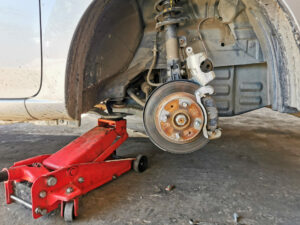
DIY Troubleshooting
- Remove your wheels and inspect your brake rotors for irregular wear and grooves. If you suspect that your rotors are warped, replace the brake rotors AND the brake pads at the same time. Replacing brake pads when replacing rotors is recommended to ensure even wear, optimize braking performance, and achieve cost-effectiveness by replacing both brake components simultaneously.
If new brake rotors AND pads don’t resolve the brake shake, move on to the next common culprit of brake shake, Wheel Alignment Issues.
2. Worn Brake Pads
When you feel your car shake when you brake, you may have worn brake pads. When was the last time your vehicle had a brake service appointment and had its brake pads replaced?
Over time, braking causes your brake pads to wear down. This is normal, but when your brake pads become too worn down, they lose their ability to make contact with the rotors properly.
As a result, when you press down on the brakes, the pads are not able to provide the necessary friction to slow down the wheels smoothly. Instead, worn brake pads can cause the wheels to vibrate at high speed, resulting in a shaking sensation in your car.
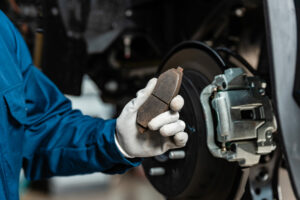
DIY Troubleshooting
- Remove your wheels and inspect your brake pad thickness. Ensure that your pads are above the recommended thickness. Brake pads are considered to be moderately worn when they reach 4 to 6 millimeters (1/8 to 1/4 inch) thick and should be replaced soon.
If your rotors and brake pads appear to be good to go, move on to the next common culprit for brake shake, or find a local brake shop to diagnose your brake issues.
3. Wheel Alignment Issues
If you find your car shaking or vibrating when applying the brakes, it could be an indication of potential issues with your wheel alignment. When was the last time a shop did an alignment on your vehicle?
Wheel alignment refers to the positioning of the wheels relative to each other and the vehicle’s body, and proper wheel alignment ensures that all four wheels are parallel and perpendicular to the ground.
If your steering wheel feels off-center or pulls to one side, this too, could be a sign of poor wheel alignment that may be contributing to brake shake.
DIY Troubleshooting
- Ensure that all of your wheel bolts are securely fastened. Refer to your vehicle’s manual for torque specs to ensure that you do not overtighten the bolts. If your wheel isn’t fully secured and has loose bolts, it can cause your car to shake when driving.
If you suspect that your wheel alignment is causing your brake shake, it’s best to have it checked out by a certified auto shop equipped with an alignment rack.
4. Suspension Problems
Have you ever taken a peek underneath your car to see how everything is connected? There are different parts, like springs, control arms, and joints that work together to keep your ride stable and smooth.
If any part, like the ball joints (which are like the knees of a car), gets damaged or worn, it can cause extra movement. This extra movement might make the car shake or vibrate in certain situations, such as when you press the brakes.
If you suspect that a suspension component is causing your car to shake when braking, find a local mechanic for diagnosis and repair.
5. Unbalanced Tires
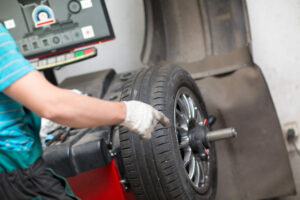
Have you ever noticed little square or rectangular pieces of metal attached to your wheel? These are wheel weights designed to balance the weight combination of rubber tire on each wheel. Wheel weights are added when you get new tires, and may fall off or move out of place over time.
Missing or misplaced wheel weights lead to vibrations that can be felt through the steering wheel and the entire car, and are most noticeable at certain speeds or when you apply the brakes.
So, if you’ve been wondering why your car shakes when you brake, unbalanced tires could be the culprit. Don’t worry though. This is a common issue that can easily be resolved by getting your tires balanced by an equipped tire shop.
Find Brake Services
If you’re experiencing braking issues, it’s best to discuss your symptoms with an experienced auto shop. Auto techs have a thorough understanding of each and every system in your vehicle and how the forces of driving interact with each.
For most shops, you can schedule an independent diagnosis appointment or request that your mechanic inspect the issue during a routine maintenance appointment. Find a local auto repair shop to diagnose your brake issues.
